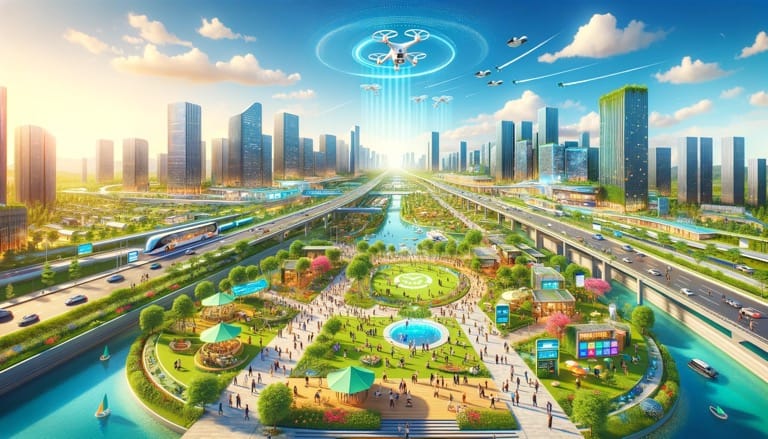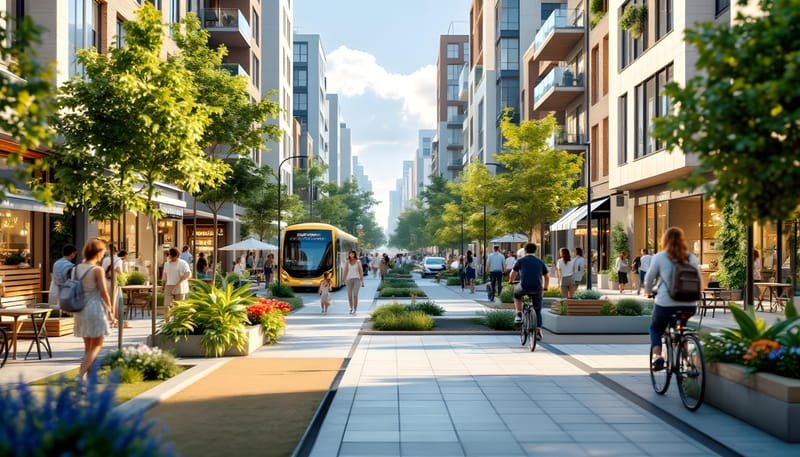Vietnam's Urban Evolution: Pioneering Smart and 15-Minute Cities for a Futuristic Digital World Order
In the heart of Southeast Asia, Vietnam is emerging as a beacon of urban innovation, rapidly transitioning into a futuristic landscape dotted with smart cities and embracing the 15-minute city concept. This transformative journey is not just reshaping the country's urban fabric but also positioning it as a
In the heart of Southeast Asia, Vietnam is emerging as a beacon of urban innovation, rapidly transitioning into a futuristic landscape dotted with smart cities and embracing the 15-minute city concept. This transformative journey is not just reshaping the country's urban fabric but also positioning it as a frontrunner in the global discourse on sustainable and digital urban living.
The Dawn of a New Urban Era
Vietnam's commitment to developing smart cities is encapsulated in ambitious projects across the nation, from Hanoi's $4.2 billion smart city initiative to the recognition of Da Nang and Ho Chi Minh City at the Smart City Awards 2023. These cities are not just undergoing a physical transformation but are also becoming testbeds for innovative solutions addressing modern urban challenges.
At the forefront is Hanoi's sprawling smart city project in Dong Anh District, a collaborative venture between Vietnam's BRG Corporation and Japan's Sumitomo Corporation. Envisioned to complete in five phases over nine years, this project aims to create a harmonious ecosystem blending urban living with technology, sustainability, and community welfare.
Smart, Sustainable, and Livable: The Philosophy of 15-Minute Cities
The concept of 15-minute cities, where essential services and amenities are within a 15-minute reach, is gaining traction in Vietnam. This approach not only enhances the quality of life but also reduces the environmental footprint by minimizing reliance on vehicular transport. It encourages a shift towards a more localized, community-focused urban living, which Vietnam is keenly adopting in its smart city projects.
The Digital World Order and Vietnam's Urban Future
The leap into smart cities is part of Vietnam's broader vision for a digital world order, where technology and data drive development and improve citizen's lives. From IoT applications managing traffic and pollution to AI-enhanced public services, Vietnam's urban centers are becoming showcases of digital innovation.
The Road to 2030 and Beyond
Looking ahead, Vietnam's urban evolution is set to accelerate, with plans extending well into 2030 and beyond. The focus is not just on expanding the smart city projects but also on ensuring they are inclusive, sustainable, and adaptable to future challenges. The vision is a network of interconnected, tech-savvy cities that are resilient to climate change, economic shifts, and social transformations.
Conclusion
Vietnam's journey towards becoming a leader in smart and 15-minute cities is a testament to its ambitious urban planning and innovation strategy. By focusing on sustainability, digital integration, and community-centric development, Vietnam is not just preparing for a futuristic digital world order but is also setting a benchmark for urban development worldwide. As these projects unfold, they offer valuable insights and lessons for global cities aspiring towards a more sustainable and tech-driven future.
Vietnam's embrace of the future through smart cities and the 15-minute city concept heralds a new era of urban living, blending tradition with innovation, and sustainability with technology. This bold leap forward is not just transforming its cities but also offering a blueprint for the world on how to navigate the complex challenges of 21st-century urbanization.





